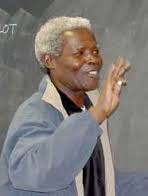Ayi Kwei Armah is one of Africa's most distinguished and venerated writers; a man whose name is often uttered with bated breath and consummate respect by lovers of African writing.
Armah, from the beginning was destined
for literary greatness after publishing his first novel, The beautyful ones are not yet born, almost fifty years ago!
His debut novel would shock the world with
his wholesale denunciation of corruption
in an Africa just apparently freed of the burden of colonialism. Armah's no
holds barred descriptions of filth and horrific corruption was contrasted with
the nigh-pristine character and integrity of the protagonist of the work, "The
man".
Thereafter Armah continued publishing
powerful novels, perhaps culminating in the teeming sociological work, The Healers.
By this time he had published five powerful novels; then there was a lull for a
long time. Then further massive works would follow even until recently.
Armah's profound, thought-provoking
convincing works have attracted heaps of critical attention from inception.
Countless full-length books and essays continue to be published focusing on
Armah and his work.
A rather controversial figure for
decades, Armah might not have had the most congenial personal relationships
with some of his fellow writers, but he remains one of the veritable icons of
African writing - a most talented creative writer and polemicist.
Armah was born to Fante speaking
parents, and descending on his father's side from a royal family in the Ga
nation, Armah was born in the port city of Sekondi-Takoradi in Ghana. Having
attended Achimota School, he left Ghana in 1959 to attend Groton School in Groton, MA. After graduating he entered Harvard University,
receiving a degree in Sociology. Armah then moved
to Algeria and worked as a translator for the magazine Revolution Africaine. In 1964, Armah returned to Ghana, where he
was a scriptwriter for Ghana Television and later taught English at the
Navrongo School.
Between 1967 and 1968, he was editor of
Jeune Afrique magazine in Paris. From 1968-1970, Armah studied at Columbia
University, obtaining his MFA in Creative Writing. In the 1970s, he worked as a
teacher in East Africa, at the College of National Education, Chang'ombe,
Tanzania, and at the National University of Lesotho. He lived in Senegal, in the 1980s and taught at Amherst and
the University of Wisconsin-Madison.
In Fragments - Armah's second novel - the protagonist,
Baako, is a "been-to" - a man who has been to the United States and
received his education there. Back in Ghana he is regarded with superstitious
awe as a link to the Western life style. Baako's grandmother Naana, a
blind-seer, stands in living contact with the ancestors. Under the strain of
the unfulfilled expectations Baako finally breaks. As in his first novel, Armah
contrasts the two worlds of materialism and moral values, corruption and
dreams, two worlds of integrity and social pressure.
Why Are We So Blest? (1972) was set largely in an American University, and
focused on a student, Modin Dofu, who has dropped out of Harvard. Disillusioned
Modin is torn between independence and Western values. He meets a Portuguese
black African named Solo, who has already suffered a mental breakdown, and a
white American girl, Aimée Reitsch. Solo, the rejected writer, keeps a diary,
which is the substance of the novel. Aimée's frigidity and devotion to the
revolution leads finally to destruction, when Modin is killed in the desert by
O.A.S. revolutionaries.
Trans Atlantic and African slave trades
are the subject of Armah's Two Thousand seasons (1973) in which a pluralized
communal voice speaks through the history of Africa, its wet and dry seasons, from
a period of one thousand years. Arab and European oppressors are portrayed as
"predators," "destroyers," and "zombies". The
novel is written in allegorical tone, and shifts from autobiographical and
realistic details to philosophical pondering, prophesying a new age.
The Healers (1979) mixed fact and fiction about the fall of the Ashante
Empire. The healers in question are traditional medicine practitioners who see
fragmentation as the lethal disease of Africa.
Armah remained silent as a novelist for
a long period until 1995 when he published Osiris Rising, depicting a
radical educational reform group which reinstates ancient Egypt at the center
of its curriculum.
Especially Armah's later work have
evoked strong reaction from many critics. Two Thousand Seasons has been
labelled "dull and verbose" by some pundits; although Wole Soyinka considered its vision secular
and humane.
As an essayist Armah has dealt with the
identity and predicament of Africa. His main concern is for the creation of a
pan-African agency that will embrace all the diverse cultures and languages of
the continent. Armah has called for the adoption of Kiswahili as the
continental language.
Ayi Kwei Armah's Works
The
beautyful ones are not yet born
Fragments
Why are we so blest?
Two thousand Seasons
The Healers
Osiris Rising
KMT: In the house of life
The Eloquence of the Scribes
Hieroglyphics for Babies

A magnificent novelist...reading The Healers as a very young man made me realise that black African authors could be more than world class
ReplyDelete